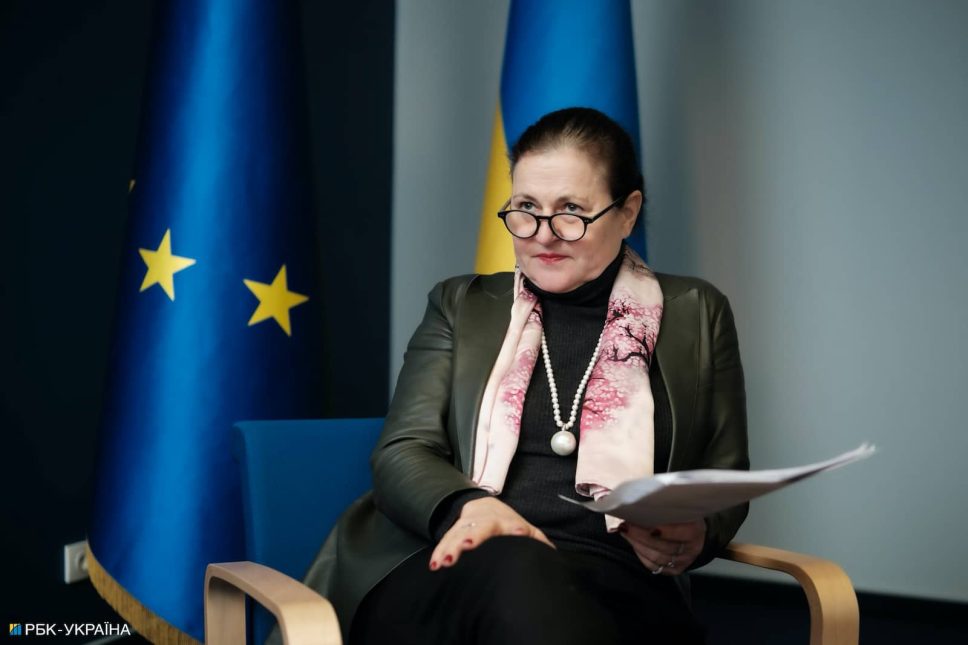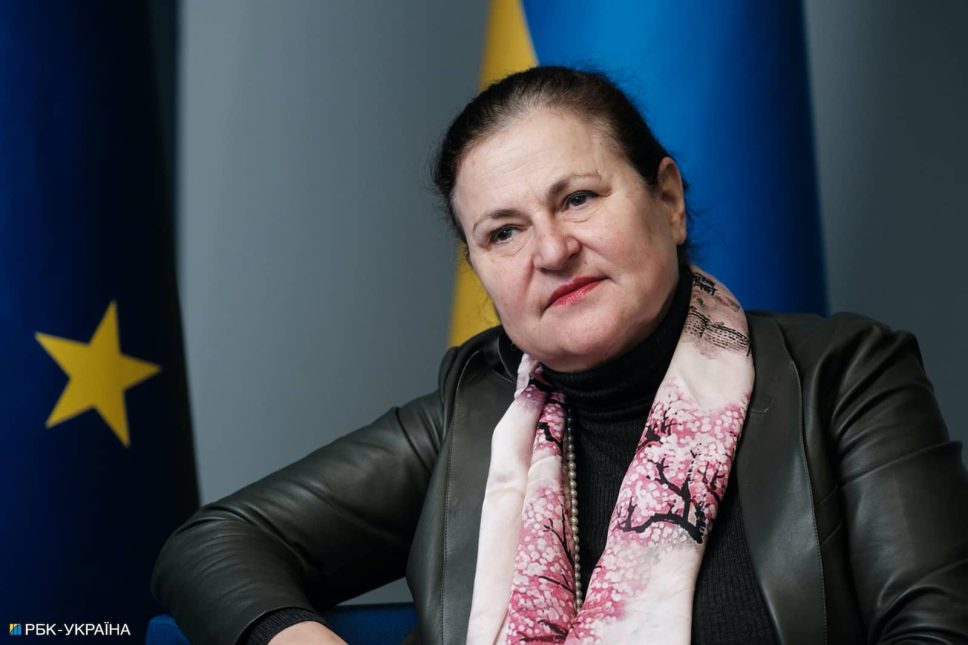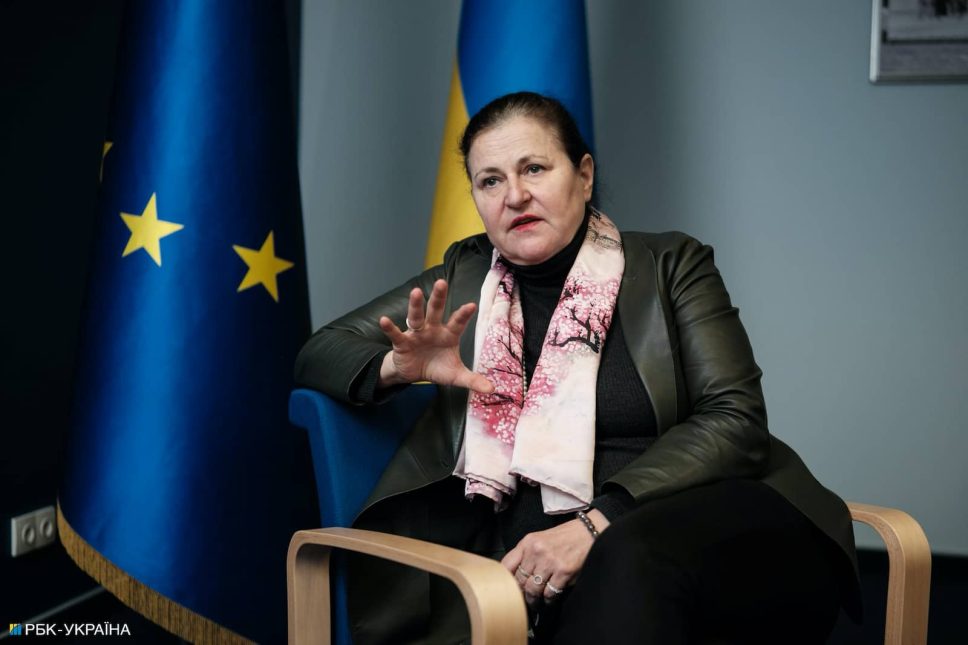
‘There is no Ukraine fatigue in the EU. There are distractions,’ Katarína Mathernová
Photo: Katarína Mathernová, Ambassador of the EU to Ukraine (Vitalii Nosach/RBC-Ukraine)
Ambassador of the EU to Ukraine Katarína Mathernová discussed in an interview with RBC-Ukraine about the allocation of 50 billion euros to Ukraine over the next four years, the conditions of this assistance, the Hungarian factor, military support for Ukraine, and the start of negotiations on EU accession.
RBC-Ukraine met with the head of the EU representation in Ukraine, Katarína Mathernová, the day after the European Union finally approved the allocation of 50 billion euros to Ukraine for four years under the Ukraine Facility program.
This decision was made only on the second attempt. Initially, in mid-December, the allocation of funds to Ukraine was blocked by Hungarian Prime Minister Viktor Orban, whose persuasion took a long time, with the active personal involvement of the leaders of leading European countries.
The receipt of long-term financing by Ukraine is essential because assistance from the United States is stuck in Congress, and the prospects for receiving it are extremely uncertain.
Let’s start with a recent EU decision to allocate €50 billion for Ukraine. When Ukraine will be able to receive the first tranche of this assistance, our government officials say that it may happen as soon as in March. Is this realistic?
I think it’s realistic. First, let me say that I think it was indeed a historic decision for Ukraine. It was also great news for the European Union because it showed solidarity, commitment to Ukraine, and unity. The agreement had to be found in unanimity.
In addition to the package for Ukraine, there were other elements, this was a revision of the broad multi-year financial framework. So the Ukraine package was the biggest of it all but there were other elements, adopted altogether, I think €64 billion, 50 of which are for Ukraine. Everybody is aware of the dire budgetary situation in Ukraine. And I spoke to my colleagues yesterday. I have a high degree of certainty. I can say that we should be able to disburse in March.
Will it be about several billion euros?
Yes.

What is the reason for setting the conditions for the allocation of these funds? For example, ‘upholding and respecting effective democratic mechanisms, including a multiparty parliamentary system’ and so on.
Let me say very clearly, for all of our lending, which we have done over the last ten years, a lot, both as macrofinancial assistance and as budget support, we have always put conditions. This is not the first time.
A precondition for the support for Ukraine under the facility shall be that Ukraine continues to uphold and respect. But this was a precondition for all of our macrofinancial assistance before.
The language was taken from the previous instruments (on Ukraine financing – Ed).
From all the previous tranches during these two years?
Not only two years, ten years. They are called preconditions. And then there are specific conditions for each tranche etc. But the precondition is that Ukraine is a democratic pluralistic country.
So to sum it up: do you notice any specific problems with democracy?
Well, I think that in a country at war, in martial law, there obviously are hindrances to the full panoply of rights. Ukraine is a country at war. But let me repeat, these are preconditions of all previous instruments.
Ukraine Facility program – when it may be finally launched and what about its size? 5 bln euros or may it be more?
I think it’s premature to discuss. This is an active discussion among the EU countries. The next rendezvous is the European Council in March And I understand it’s going to be discussed there.
So this may happen, but it may not happen either. Right?
I believe there is a good chance it will happen, but we are not going to know for a bit of time.
Issues with Hungary. How to avoid situations when one single country can block key decisions of the whole European Union for quite a long time. And it applies not only to Ukraine-related issues.
This is the nature of European decision-making. There are a lot of areas where we can agree and pass certain measures and regulations, with something that’s called qualified majority voting. There are some areas where the member states have essentially a veto power and the issue of the European budget is one of them, and also issues of foreign policy and the enlargement of the European Union are such that require unanimity, so you can’t prevent the situation.
You just need to engage. And you are watching the EU decision-making in front of you. You know, you have to find a basis for agreement. You have to find a basis for compromise. You have to find ways of convincing those who don’t want to move on something.
But it really took a lot of time and a lot of effort from different EU leaders.
Sometimes it takes even longer.
So nothing can be done with it. Am I right?
Well, for any changes to the voting mechanism, you would need to change the treaty. And to change the treaty again you need unanimity.

May Viktor Orban find any allies in his constant struggle with Brussels, for example, Robert Fico who is the prime minister of Slovakia, your native country? Because there are signals that they are forming a block.
I would take yesterday as a stronger signal than whatever signals you are referring to.
Given that the Ukrainian prospects of receiving assistance from the United States seem to be quite vague, will Europe be able to cope with supplying Ukraine with all the financial and military assistance that Ukraine needs, on its own, in short perspective, middle-term perspective, long-term perspective?
Well, I hope so, but, I also trust that our friends across the Atlantic will realize that it’s in their interest to continue supporting Ukraine both militarily and financially.
And what about this failure to fulfill the commitment of delivering 1 million shells to Ukraine by March? Why has it happened? And how to avoid similar failures in the near future?
Well, we’ll just have to continue incentivizing and pushing the European industry. And indeed, this was a testament that moving to war production is not a natural instinct in Europe. In Europe, we have lived for decades in firm conviction that war on the European continent is no longer possible. So I think with that initial shock of February 24, 2022, we have done pretty well in stepping up politically, in stepping up the societies in terms of the outpouring of solidarity in welcoming Ukrainian refugees, in bringing humanitarian aid, etc.
I think the industry has moved, perhaps less quickly than we had hoped. But there is now a strong recommitment and strong push also by the governments and the engagement with the private sector, to increase production. And you know, we are a market economy, so it’s not as easy to do it as when you have a command economy. Like in Russia. So, yeah, in that sense it has not reacted as quickly as we have hoped.
An increase in military production may be very profitable for a lot of European companies.
Initially, there was a reliance on the market. But I think that the industry needed to see the long-term commitment of the government. That was a little bit of a chicken and egg problem.
As of now, is there any Ukraine fatigue in the European Union?
I wouldn’t say that there is Ukraine fatigue, I would say differently. The active phase of war has been going on for two years now. We will have a second anniversary in a few days. And there are many crises appearing in different parts of the world. Look at the Middle East. Look at the Sahel. There are so many other crises that take away the bandwidth, that take away a certain degree of attention. I don’t think that there is necessarily Ukraine fatigue, but there are distractions, legitimate distractions with what is happening with Houthi rebels, Israel/Gaza, and Hezbollah, just to name that theater. So there are distractions. But I think that when push came to shove, Europe did show, as I said, both leadership and commitment.

Negotiations on our accession to the EU: when can they begin? Are any significant problems expected underway (for example, opposition from Hungary and its veto rights)? And are there any very rough estimates of how long these negotiations may last?
There are no rough estimates. That would be crystal balling. But I really hope that we can officially start and get the negotiating framework. And then the next step, which is this inter-governmental conference. I really hope that’s going to happen in the spring.
What about some significant troubles in this process?
Let me repeat. Every step, every step on the path to accession to the EU is subject to unanimity.
AUTHOR: MILAN LIELICH, KATERYNA DANISHEVSKA
Media, Publications
-
Deputy Ambassador of the EU on enlargement, reforms and €190 billion in support
-
EU membership in 2030? Deputy Ambassador of the EU answers students’ questions
-
How does the EU take decisions on Ukraine? Subsidiarity, unanimity and consensus among 27 countries
-
What reforms does Ukraine still need to join the EU? Deputy Ambassador of the EU answers
-
How can Ukrainian students become more involved in EU programmes and projects? Deputy Head of the EU Delegation answers
-
Are there alternatives to European integration if the road to the EU is long? Deputy Ambassador of the EU answers